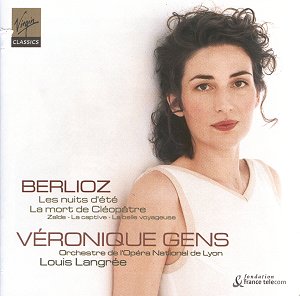Véronique Gens here joins the exalted ranks
of Régine Crespin and Janet Baker for top placing in recordings
of Berlioz’ Les nuits d'été, and certainly comes
top of the list for modern recordings. It goes without saying that her
French is impeccable (her diction is a model), but she is so obviously
attuned to Berlioz’s perfumed sounds that comparisons while listening
become almost irrelevant (and there is little higher praise than this).
Her voice is not too heavy, either, so that the Villanelle, basically
a hymn to Spring, is imbued with a joy of life, helped by Langrée’s
lilting tempo. But neither is it so light that the tragedy of the next
song, Le Spectre de la rose, is beyond her: the particular Berliozian
ecstasy of the line ‘j’arrive de Paradis’ is the equal of any of her
rivals, and she has a miraculous ability to float phrases beautifully.
Indeed, for a voice which is predominantly of a light
bent, Gens has at her disposal an endless ranges of nuances. She darkens
her tone unforgettably at the opening of ‘Sur les lagunes’ (to the unforgettable
lines, ‘Ma belle amie est morte: Je pleurerai toujours; Sous la tombe
elle emporte’ - ‘My beautiful love is dead: I shall weep forever more;
to the grave she takes with her’); her ejaculations of the syllable
‘Ah!’ are true cries from the heart. Au cimetière speaks
of an almost unbearable sadness; L’île inconnue reveals
a wonderful impetuosity.
Langrée is a fine accompanist, taking pains
to underline the modernity of Berlioz’ scoring where appropriate (both
Au cimetière and L’île inconnue contain examples
of this). The Lyon orchestra play magnificently for him (listen to the
superbly articulated upward surges of the strings in the final song
as one of many examples, so well captured by Pierre-Antoine Signoret’s
fine engineering).
The drama of La mort de Cléopâtre
(‘The Death of Cleopatra’) reveals another, darker side of Berlioz’
psyche while remaining unmistakably the work of that composer. The orchestra
excels itself in the superb scoring of the work’s introduction. Gens
projects the prevailing atmosphere of sadness and desolation with every
syllable of her utterance, every recitative-like passage refusing to
let the listener go. Predating Les Troyens by a quarter of a
century, as Yves Gérard points out in his note, it prefigures
Dido’s tragic vein in no uncertain terms and Gens is more than equipped
for the challenge. The sadness and distress, but also the pride, of
the protagonist’s recollections are palpable (when she remembers how
she appeared in triumph on the banks of the Cydnus, for example): her
evocation of eternal night (immediately prior to the Méditation)
is unforgettably bleak. The intensity of this performance is unremitting,
every word shaded and weighted with intelligent care.
Again, this is an interpretation which will hold its
own in any company, and will certainly complement Jessye Norman’s enormous
achievement with the Orchestre de Paris under Daniel Barenboim (DG 410
966-2).
The three final songs of this disc are far, far more
than just space-fillers. The text of La captive is by Victor
Hugo and elicits from Berlioz, in his 1848 setting, tremendous stillness
and beauty at its close. There is also a daring use of silence and an
unforgettable evocation of stillness. La belle voyageuse is the
fourth of the collection entitled Irlande of 1830 and is here
delightful.
It is apt that the disc should end on high spirits.
Zaide features prominent Spanish inflections (memorably invoked
by castanets in the refrain) and includes a wide variety of emotion
in its extremely brief span (3’25). Gens’s final flourish brings an
end to a memorable offering from Virgin Classics. A truly beautiful
record.
Colin Clarke


